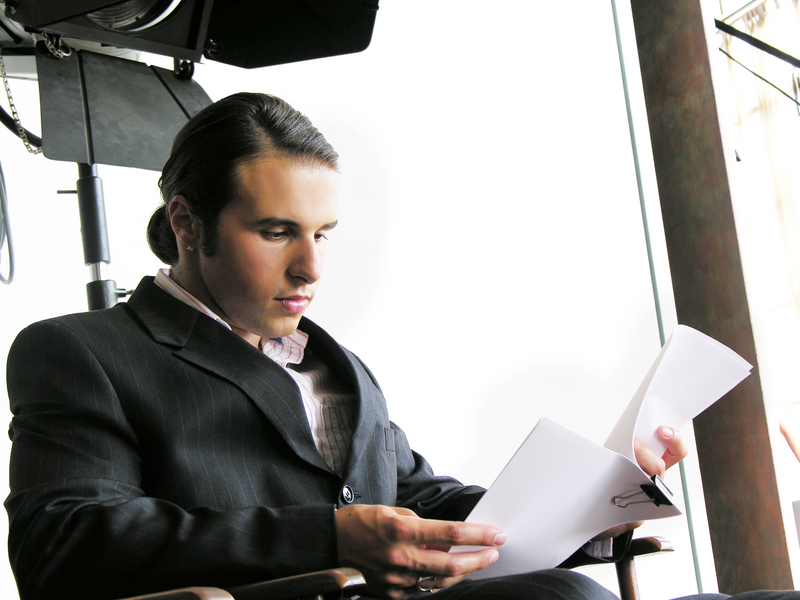 Script Breakdown – Script and Scene Analysis
Script Breakdown – Script and Scene Analysis
A) Actor as Story-Teller
There are many facets of a actor’s prep on any film or TV show – from location scouts and creative meetings to casting and scheduling.
But the first, and most important part of your job, is to understand the script – what the story is about; the themes; the story points; the characters.
An actor is a story-teller, and to be a good story-teller, you need to understand every detail about the story you are telling. There’s an old expression that says if it doesn’t work in
the script, it won’t work on the set – and boy is that true! Understanding the story requires a lot of work on your part because you need to rip the script apart to find out what it is about, what works and what doesn’t.
B) Script structure
Here is the “traditional” Three Act structure of any story:
ACT ONE – THE SET-UP (Boy Meets Girl)
ACT TWO – CONFRONTATION (Boy Loses girl-fights to get her back)
ACT THREE – RESOLUTION (Boy Gets Girl)
NOTE: There has been a lot of debate lately on script structure – how many acts there are in a script! Because this is not a writing course, (and every story ALWAYS has a Beginning, Middle and End), I will refer to all scripts as having the traditional Three Act structure. Even Television scripts follow the Three Act structure – they are just divided into Act Breaks because that is where the commercials go.
Here is a “general guide” to the physical structure of TV scripts:
1) Half-Hour Episodic TV (22-25 pages and Two Acts)
2) One-Hour Episodic TV (50 – 65 pages and Four Acts)
3) Two Hour TV Movie (100 – 110 pages and Seven Acts)
Television scripts can also be broken down further by using a Teaser and a Tag. So a one-hour TV Script could be divided up like this:
a. Teaser
b. Act One
c. Act Two
d. Act Three
e. Act Four
f. Tag
C) Script Analysis
When you first get your script, find a nice quite place and just read it through once – from start to finish. Your first pass is to get an idea of what the story is about, where it takes place and who the characters are. This is when you form your first impressions of the story and it is probably the only time you will ever enjoy the script as a story – because from now on it’s all work!!
Then, read the script again (and again, and again…) and start making notes and jotting down the answers to the following questions:
1) what is the PLOT? (what is the story about)
2) what is the THEME? (what is the message)
3) what is the LOGIC? (does the story make sense)
4) what is the EXPOSITION? (what are the characters doing/thinking)
5) what is the COMPLICATION? (what is the drama in the story)
6) what creates the tension? (what will happen next)
7) what is the MAIN QUESTION? (what problem is to be solved)
8) what is the MAIN action? (what event hooks the audience)
9) what is the CAUSE OF THE action? (what happens to the main character)
10) what is the RESULTING action? (the answer to the main question)
11) what is the CONCLUSION? (how does the story end)
12) who is the PROTAGONIST? (the main character)
13) who is the ANTAGONIST? (could be one or more characters)
14) who is the MOST INTERESTING character? (not always the main character)
15) where does the story TAKE PLACE? (location, time period)
D) Scene Analysis
Once you have an understanding of what the story is about, you then need to analyze each individual scene in the script.
1) what is the INTENT of the scene? (what is the scene used for dramatically)
2) what are the PLOT POINTS? (points that move the story forward)
3) what is the climax of each scene? (what is the turning point)
4) what is the RESOLUTION? (how is the theme resolved)
5) what is the CONCLUSION? (how does the scene end)
4) what are the important LINES OF DIALOGUE? (contain story points)
5) which character CONTROLS the scene? (who pushes the story forward)
6) what are the BEATS/UNIT CHANGES? (where does the story change directions)
E) Other Structural Elements
Here is a partial list of some other elements you need to look for during your script breakdown:
1) foreshadowing
2) recurring motifs
3) scene transitions
4) counterpoint
5) repetition
6) contrast
7) clarity of information
8) action and stunts
9) comedy scenes
10) special effects (explosions etc)
11) visual effects (CGI, green screen etc)
12) locations
F) In Conclusion
Your script breakdown will be a never-ending process. Each time you read the script, you find out something different about the story or the characters.
The script will constantly evolve. It will change because of the your creative notes – writer changes – actor changes – producer changes – network changes – location availability and on and on and on…
As long as you know what the story is about and where the story is going, you can adjust to all the changes.
About The Author
Peter D. Marshall has worked in the Film and TV Industry for over 32 years. In 2000 he created www.ActionCutPrint.com as an online resource center for Filmmakers where you will find filmmaking tips, articles and directing workshops. Peter also publishes the free monthly ezine, “The director’s chair.”http://www.actioncutprint.com mailto:pdm@actioncutprint.com




